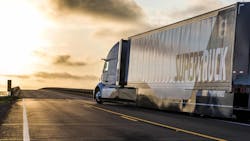We were so thrilled to be part of the recent Department of Energy’s announcement of SuperTruck 3. In case you missed the announcement, Secretary of Energy Jennifer Granholm said there is $100 million available over the next four years focused on zero-emission vehicles.
And for the first time, funding is available for both medium- and heavy-duty trucks in a variety of duty cycles. Previous SuperTruck programs were focused on heavy-duty sleeper tractors and trailers only. We think this is good news because medium-duty and daycab regional haul applications are where battery electric vehicles make a great deal of sense. The funding also supports hydrogen fuel cell electric vehicles as well.
The previous two SuperTruck programs exceeded the initial goals of 50% improvement in freight efficiency and led to the vetting of many real-world technologies that fleets have been able to take advantage of to improve their freight efficiency.
Joel Morrow of Ploger Transportation and Clark Reed of Nussbaum Transportation were also on the video call with me, and they talked about how SuperTruck validating technology is a big plus for smaller fleets and allows them to remain competitive even though they do not have the size required to be able to test a lot of technology themselves.
In addition to the funding for EVs, there is also is a funding opportunity for low greenhouse gas vehicle technologies for current engines. And funding to build electric vehicle charging infrastructure for passenger vehicles.
It will be interesting to see which truck makers and for that matter other organizations apply for the program, but regardless of who end up participating in SuperTruck 3, I am optimistic that the trucking industry will be better for it. I see it as another way for fleets of all sizes — but especially smaller fleets — to gain a better understand of electric vehicles which should speed up their deployment.
If we are going to meet the goal of net-zero carbon emissions by 2050 we are going to need more than big fleets operating zero emission vehicles. It will take a concerted effort by fleets of all sizes to drive emissions down. I am counting on SuperTruck 3 to help do that.
Michael Roeth has worked in the commercial vehicle industry for nearly 30 years, most recently as executive director of the North American Council for Freight Efficiency. He currently serves on the second National Academy of Sciences Committee on Technologies and Approaches for Reducing the Fuel Consumption of Medium and Heavy-Duty Vehicles and has held various positions in engineering, quality, sales and plant management with Navistar and Behr/Cummins.
About the Author

Michael Roeth
Executive Director
Michael Roeth is the executive director of the North American Council for Freight Efficiency. He serves on the second National Academy of Sciences Committee on Technologies and Approaches for Reducing the Fuel Consumption of Medium and Heavy-Duty Vehicles and has held various positions with Navistar and Behr/Cummins.
